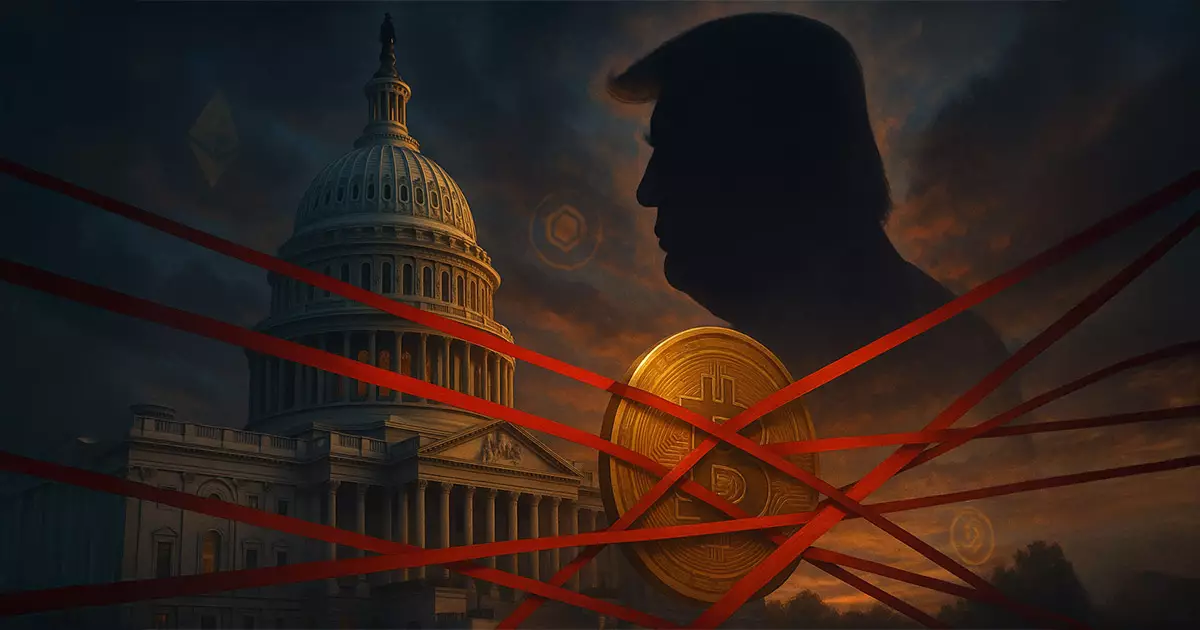In the murky waters of cryptocurrency, the actions and investments of public figures can often lead to ethical dilemmas and regulatory gridlocks. Recently, discussions have escalated around former President Donald Trump’s deep ties to the crypto market, revealing a troubling nexus of personal enrichment and potential conflicts of interest. Far from just being a flash in the pan, this evolving scenario threatens not only the future of Trump himself but also the legislative landscape surrounding cryptocurrencies. It’s an unsettling revelation that illuminates the rampant corruption hiding in plain sight—one that has the potential to derail policies that could ultimately benefit countless Americans.
The GENIUS Act: At the Crossroads of Politicking and Progress
At the heart of the current turmoil is the Guiding and Establishing National Innovation for U.S. Stablecoins (GENIUS) Act, a bill designed to create a robust regulatory framework for stablecoins. This legislation has been dubbed vital for establishing clarity in the burgeoning crypto market. However, progress has been stymied by ongoing concerns regarding the ethics of Trump’s crypto ventures. Industry experts like Ryan Gilbert have lamented this unfortunate entanglement, suggesting that personal business interests should yield to solid policy formulation. When legislation meant to ensure consumer protections drags its feet due to the personal gain of a former president, it creates a dangerous precedent that could hinder innovation in the financial sector.
Conflict of Interest or Just Politics as Usual?
Critics have leveled severe accusations against Trump, claiming his profits from crypto ventures serve as a glaring conflict of interest that has hindered bipartisan legislative efforts around crypto regulation. After launching the $TRUMP memecoin, which saw its value plummet almost immediately post-inauguration, questions began to swirl about the influence of Trump’s personal financial empire on crypto policy-making. It is disconcerting to think that a political figure could manipulate regulation not for the public good, but rather to line his own pockets. This sentiment is echoed by politicians across the aisle, including Congresswoman Maxine Waters, who stated that Trump’s emphasis on filling his own coffers rather than addressing the needs of Americans reflects an alarming level of corruption.
The Financial Fallout: Small Investors Left in the Dust
While Trump’s ventures have seemingly worked wonders for his financial stature, they have led many ordinary investors down a treacherous path marked by significant loss. More than $2 billion vanished following the catastrophic fall of the $TRUMP memecoin, effectively turning many hopeful small investors into cautionary tales. The massive disparity between the profits earned by Trump-linked companies—in excess of $100 million from trading fees alone—and the losses suffered by everyday holders serves as a stark reminder of the risks entangled within crypto markets that lack ethical checks and balances. This brings to light a pressing need for robust regulations that prioritize investor protection over personal gain.
The Dark Underbelly of Influence Peddling
In addition to misleading investors, Trump’s push into cryptocurrency raises larger questions about influence peddling and regulatory capture. As evidenced by his ongoing relationship with figures in the crypto space, including a notable association with Binance, the optics are troubling at best. Critics like Senator Mark Kelly have raised alarms over the possibility of lawmakers enriching Trump by trading cryptocurrencies he owns or controls. This is a narrative that not only hints at corruption but undermines the very foundation of democratic governance—the impartiality of political figures.
Future of Regulation in Jeopardy
Despite strong bipartisan support for the GENIUS Act, ongoing disputes drag it through an increasingly murky political scene. The implications are vast; crucial discussions meant to address national security and money laundering are being overshadowed by the pressing need to confront alleged corruption stemming from Trump’s crypto ventures. Senators are already negotiating fresh terms to pass the GENIUS Act, but any delay risks pushing innovative legislation into the realm of political hostage-taking. A regulatory framework that could bring order to the chaotic crypto market hangs in the balance, caught between the storms of personal and political gain.
The revelations surrounding Trump’s cryptocurrency endeavors present more than just a scandal; they epitomize the intertwining of profit and politics, and for the American populace, they exemplify a disturbing departure from ethical governance. With potentially lasting ramifications, stakeholders in cryptocurrency and the economy at large must be vigilant as this unfolding drama continues to reveal itself, threatening both the digital asset space and the regulatory structures that should guide it.

